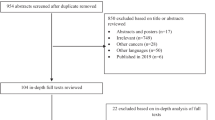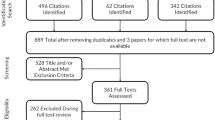Abstract
Objective
This study aimed to test the reliability, psychometric, and clinical validity of the use of the Functional Assessment of Cancer Therapy—Brain (FACT-Br) in patients with brain metastases.
Methods
Patients with brain metastases were interviewed using the FACT-Br (including the FACT-general) 1 week prior to treatment. All patients completed a follow-up assessment 1 month post-treatment. Patients with a good performance status and receiving stereotactic radiosurgery completed an additional 1 week follow-up assessment after the initial baseline interview to assess test–retest reliability.
Results
Forty patients had complete 1 month follow-up data. Ten of these patients also completed the 1 week follow-up assessment from baseline. The median Karnofsky performance status of patients was 80 and the median age was 64 years. All subscales of the FACT-Br were found to be conceptually related (except for two correlations) using the following subscales: physical well-being (PWB), social/family well-being (SWB), emotional well-being (EWB), functional well-being (FWB), FACT-G total score, brain cancer subscale (BrC), and the FACT-Br total score. All FACT-Br scores demonstrated excellent reliability, except for the SWB scale which revealed good reliability. The FACT-Br scores showed no significant change in the quality of life (QoL) of patients from baseline to 1 month follow-up.
Conclusion
The use of the combined FACT-G and FACT-Br Subscale to assess QoL specifically in patients with brain metastases has successfully undergone psychometric validation. Future clinical trials should use the FACT-G and FACT-Br Subscale to assess QoL in this patient population.


Similar content being viewed by others
References
Doyle M, Bradley NM, Li K, Sinclair E, Lam K, Chan G et al (2007) Quality of life in patients with brain metastases treated with a palliative course of whole-brain radiotherapy. J Palliat Med 10(2):367–374
Thomas SS, Dunbar EM (2010) Modern multidisciplinary management of brain metastases. Curr Oncol Rep 12(1):34–40
Eichler AF, Loeffler JS (2007) Multidisciplinary management of brain metastases. Oncologist 12(7):884–898
Chang EL, Wefel JS, Maor MH, Hassenbusch SJ III, Mahajan A, Lang FF et al (2007) A pilot study of neurocognitive function in patients with one to three new brain metastases initially treated with stereotactic radiosurgery alone. Neurosurgery 60(2):277–283, discussion 283–4
Posner JB (1977) Management of central nervous system metastases. Semin Oncol 4(1):81–91
Tsao MN, Lloyd N, Wong R, Chow E, Rakovitch E, Laperriere N (2006) Whole brain radiotherapy for the treatment of multiple brain metastases. Cochrane Database Syst Rev 3:003869
Movsas B (2003) Quality of life in oncology trials: a clinical guide. Semin Radiat Oncol 13(3):235–247
Weitzner MA, Meyers CA, Gelke CK, Byrne KS, Cella DF, Levin VA (1995) The Functional Assessment of Cancer Therapy (FACT) scale. Development of a brain subscale and revalidation of the general version (FACT-G) in patients with primary brain tumors. Cancer 75(5):1151–1161
Chen E, Cella D, Zeng L, Thavarajah N, Zhang L, Chang E, et al. Content validation of the FACT-Br with patients and health-care professionals to assess quality of life in patients with brain metastases. Journal of Radiation Oncology 2012
Caissie A, Nguyen J, Chen E, Zhang L, Sahgal A, Clemons M et al (2012) Quality of life in patients with brain metastases using the EORTC QLQ-BN20 + 2 and QLQ-C15-PAL. Int J Radiat Oncol Biol Phys 83(4):1238–1245
Cicchetti DV, Sparrow SA (1981) Developing criteria for establishing interrater reliability of specific items: applications to assessment of adaptive behavior. Am J Ment Defic 86(2):127–137
Nunnally JC, Bernstein IH (1994) Psychometric theory, 3rd edn. Mc Graw-Hill, New York
Cohen J (1988) Statistical power analysis for the behavioral science. Lawrence Erlbaum Associates, New Jersey
Lien K, Zeng L, Nguyen J, Cramarossa G, Cella D, Chang E et al (2011) FACT-Br for assessment of quality of life in patients receiving treatment for brain metastases: a literature review. Expert Rev Pharmacoecon Outcome Res 11(6):701–708
Li J, Bentzen SM, Li J, Renschler M, Mehta MP (2008) Relationship between neurocognitive function and quality of life after whole-brain radiotherapy in patients with brain metastasis. Int J Radiat Oncol Biol Phys 71(1):64–70
Bezjak A, Adam J, Barton R, Panzarella T, Laperriere N, Wong CS et al (2002) Symptom response after palliative radiotherapy for patients with brain metastases. Eur J Cancer 38(4):487–496
Wong J, Hird A, Zhang L, Tsao M, Sinclair E, Barnes E et al (2009) Symptoms and quality of life in cancer patients with brain metastases following palliative radiotherapy. Int J Radiat Oncol Biol Phys 75(4):1125–1131
Friendlander AH, Ettinger RL (2009) Karnofsky performance status scale. Spec Care Dent 29(4):147–148
Hempen C, Weiss E, Hess CF (2002) Dexamethasone treatment in patients with brain metastases and primary brain tumors: do the benefits outweigh the side-effects? Support Care Cancer 10(4):322–328
Tsao M, Xu W, Sahgal A (2012) A meta-analysis evaluating stereotactic radiosurgery, whole-brain radiotherapy, or both for patients presenting with a limited number of brain metastases. Cancer 118(9):2486–2493
Acknowledgments
We thank the generous support of the Bratty Family Fund, Michael and Karyn Goldstein Cancer Research Fund, Joseph and Silvana Melara Cancer Research Fund, and the Ofelia Cancer Research Fund.
Conflicts of interest
None.
Author information
Authors and Affiliations
Corresponding author
Appendix I
Appendix I



Rights and permissions
About this article
Cite this article
Thavarajah, N., Bedard, G., Zhang, L. et al. Psychometric validation of the functional assessment of cancer therapy—brain (FACT-Br) for assessing quality of life in patients with brain metastases. Support Care Cancer 22, 1017–1028 (2014). https://doi.org/10.1007/s00520-013-2060-8
Received:
Accepted:
Published:
Issue Date:
DOI: https://doi.org/10.1007/s00520-013-2060-8




